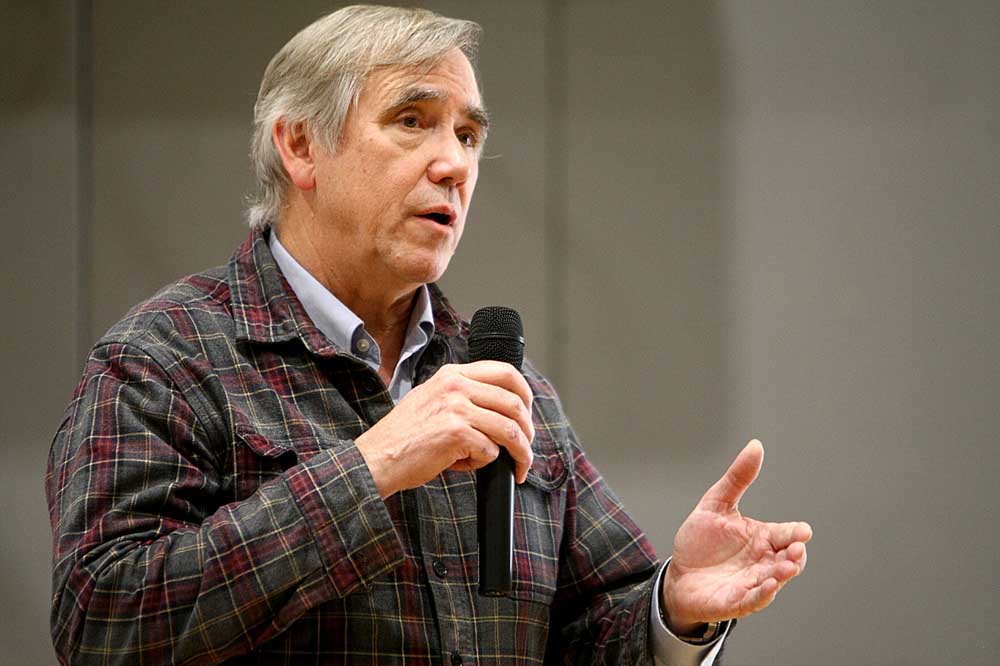Capital Chatter: Sitting down with House Speaker Julie Fahey
Published 4:00 pm Thursday, August 22, 2024

- capital chatter logo
Geography and terrain launched Julie Fahey’s journey into Oregon politics.
“Mountain climbing is not a great hobby to have when you live in the Midwest,” Fahey mused when we met recently for a lengthy conversation at a West Eugene café. As speaker of the Oregon House, she is co-CEO of the Legislature with Senate President Rob Wagner, placing her among the state’s political elite.
Trending
Fahey and her husband, Jake, had visited the Pacific Northwest on climbing trips — she summited Mt. Rainier for her 30th birthday — and the Oregon outdoors and the Eugene scene appealed to them. In 2009, they took the leap, moving from the Midwest.
She participated in Emerge Oregon, which prepares Democratic women to seek public office. When then-state Rep. Val Hoyle ran for secretary of state in 2016, Fahey ran for her House seat. She defeated now-Sen. James Manning Jr. in the Democratic primary and Republican Kathy Lamberg in the general.
“I ran in part because I saw myself as being a business progressive, someone who has progressive values but with real world experience with businesses trying to implement policies and trying to do the right thing,” Fahey said.
A human resources consultant, she had been interested in education and workforce issues. She knocked on 7,000 doors during the campaign, which influenced her legislative priorities.
“Housing was the thing that people were talking about. I knocked on doors where people were, ‘I’m about to be evicted. I don’t know what I’m going to do’ – multiple doors of trying to connect people to resources — and ‘My rent went up $300. I don’t know what I’m going to do,’” Fahey recalled. “Even in 2016, it felt like West Eugene was the canary in the coal mine on the housing work … In the Legislature, we’re generalists but you also try and figure out what is your specialty, your two or three specialties that you’re going to focus on. And for me, housing was pretty clear.”
In 2022, her fellow House Democrats chose Fahey as majority leader. In March, she was elected speaker when Dan Rayfield stepped aside to concentrate on his campaign for attorney general.
Trending
“Some folks have said, ‘Oh, you know, there’s no place for moderate Democrats.’ I thoroughly disagree with that,” Fahey said. “Coming from a business background, I don’t necessarily conceive of myself as a moderate Democrat, but I’m someone who really cares that the stuff that we do works.”
She described her approach as, “I don’t actually care about your ideology at all. I care about whether you’re willing to do the work. There are people in both parties who are willing to do that.”
As an example, she cited the work that Mark Owens, R-Crane, has done on water issues with Ken Helm, D-Portland, chair of the Agriculture, Land Use, Natural Resources and Water Committee.
“He’s proven over many years that he is someone who can be trusted,” Fahey said of Owens. “He’s willing to put in the hours and the policy expertise, and he is a real ‘thought partner’ to Ken Helm on those water issues … I wanted to send a message to the Republicans that want to be governing partners with us and want to do the work, that there’s a seat at the table for you if you want to do the work. And so I made him co-chair of the natural resources committee with Ken.”
Fahey said lawmakers will have a packed agenda for their 2025 session, including education, housing and homelessness, behavioral health, transportation, climate action and consumer protection. Lawmakers also must deal with increased caseloads in Medicaid and human services.
“Headed into ’25, the budget picture doesn’t look quite as rosy. And I know people have said, ‘Oh, but you’ve said that a bunch of times in the last four years.’ But I think this time there’s no federal resources riding to the rescue,” Fahey said.
She continued: “I think we have a lot of legislators, a lot of advocates who have only served in an environment where we were flush with resources. So what are the expectations there? I suspect it’s a lot easier to be speaker in an environment where you have a lot of resources to go around than it is to be speaker in the reverse.”
More financial clarity might emerge from the quarterly state economic and revenue forecasts that will be issued on Wednesday and on Nov. 20.





